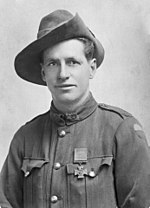James Park Woods, Date of Birth, Place of Birth, Date of Death
TweetJames Park Woods
Australian recipient of the Victoria CrossAbout James Park Woods
- James Park Woods (4 January 1886 – 18 January 1963) was an Australian recipient of the Victoria Cross during World War I; the Victoria Cross was the highest award for gallantry in the face of the enemy that could be awarded to members of the Australian armed forces at the time.
- Woods enlisted in the Australian Imperial Force in September 1916 and, after training in Australia and the United Kingdom, joined his unit, the 48th Battalion, in France in September 1917.
- Along with the rest of his battalion, he participated in the First Battle of Passchendaele the following month.
- In early 1918, Woods was hospitalised for several months before rejoining his unit in May.
- He again reported sick in July, and did not return to the 48th Battalion until mid-August. On 18 September 1918, the 48th Battalion was involved in the attack on the Hindenburg Outpost Line during the Hundred Days Offensive.
- After the first phase of the attack, some elements of Woods' unit were tasked to support another battalion as it conducted a further assault.
- When it was suspected that flanking British troops had not gone forward to their objective as reported, a four-man patrol including Woods attempted to make contact with them.
- Instead of finding British troops, they encountered a strong German post and, after calling for reinforcements, attacked it, driving more than thirty Germans from the position.
- Woods' actions during this assault and subsequent defence of the captured post resulted in him being awarded the Victoria Cross.
- Woods survived the war, returned to Australia and operated a vineyard and orchard in Western Australia.
- He retired early due to ill health and died in 1963.
- His medals are displayed in the Hall of Valour at the Australian War Memorial.
Read more at Wikipedia


 Date of Birth:
Date of Birth:  Place of Birth: Two Wells, South Australia, Australia
Place of Birth: Two Wells, South Australia, Australia
